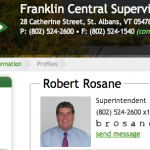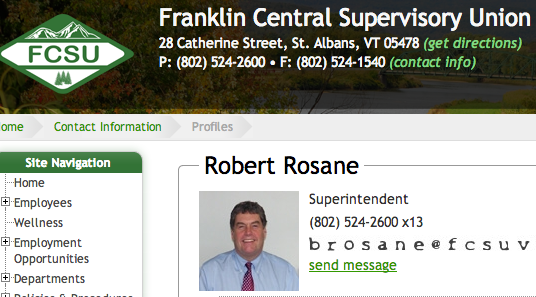NEW NEWSWIRE TODAY! Click here for the latest weekly report on education news and commentary you won’t find anywhere else, spiced with a dash of irreverence, from the nation’s leading voice in school reform.
How Do We Change the Dropout Factories in America?
Huffington Post Blog by Kevin P. Chavous, December 18, 2012
By now, we know why many of our kids drop out of school. Reasons ranging from family and other social challenges, poor instruction, a well-intentioned principal oblivious to student behavior problems, apathetic teachers or some who simply don’t have the capacity or the interest in controlling disruptive students.
A Springboard to Higher Ed
Wall Street Journal, December 19, 2012
Ms. Perez is one of a growing number of students taking community-college courses at their high schools. These “dual-enrollment” classes are a low- or no-cost way for students to gain college credits, helping smooth their way to a college degree.
McDonnell: It’s Time To Discuss Arming Teachers
Washington Times, DC, December 19, 2012
Virginia Gov. Bob McDonnell said Tuesday that policymakers should not overreact to the Connecticut school shooting but should discuss allowing school officials to carry firearms on campus.
Coalition Aims to Move Beyond ‘Old Dialogue’ for School Reform
WUMN, WI, December 18, 2012
Lost in the talk of fiscal cliff negotiations is the direction of federal education policy, as President Obama prepares to start his second term in office.
FROM THE STATES
CALIFORNIA
Proposed Adelanto Charter School Gets Warmer Reception From School Board
San Bernardino Sun, CA, December 18, 2012
The charter school operator chosen by parents to take over their struggling elementary school got a warmer reception on Tuesday than the last time they appeared before the local school board.
Novato School Officials Reject Charter School Proposal
Marin Independent Journal, December 18, 2012
The Novato Unified School District board voted unanimously Tuesday to reject a petition for a new charter school, paving the way for a possible appeal to the Marin County Office of Education.
DISTRICT OF COLUMBIA
What’s The Rush To Close D.C. Schools?
Washington Post, DC, December 18, 2012
Regarding the Dec. 2 Local Opinions commentary “Do school closings knock kids off course?” by Umut Özek and Michael Hansen:
FLORIDA
Lake Wales Charter Schools Look For Way to Improve Teacher Pay and Benefits
News Chief, FL, December 19, 2012
The Charter System still needs a plan for better pay and benefits to retain teachers.
GEORGIA
DeKalb Leaders React To School Board Probation
The Atlanta Journal-Constitution, GA, December 18, 2012
Others across DeKalb were also expressing alarm and doubts that the school board would correct itself. Some promised action aimed at policing the board or even starting a new school system. Others took a measured approach.
ILLINOIS
Teachers Union Marches On Loop Office Of Mayor’s Pal And Charter Schools Booster
Chicago Sun Times, IL, December 18, 2012
A day before the Chicago Board of Education is set to approve new charter schools even as it considers closing traditional schools, the Chicago Teachers Union blasted a wealthy charter supporter and friend of the mayor.
Document Shows Emanuel Administration Had Detailed School Closing Plans
Chicago Tribune, IL, December 19, 2012
An internal Chicago Public Schools document obtained by the Tribune shows for the first time that the Emanuel administration has weighed how many elementary and high schools to close in which neighborhoods and how to manage the public fallout.
Guns in Schools, Concealed Carry and Veterans
Chicago Now, IL, December 18, 2012
I simply can’t get on board with the idea of taking after Israel and arming every teacher. We can’t get enough qualified teachers in our schools as it is. Now we are going to add marksmanship to the requirements for a teaching certificate?
INDIANA
Charter School OKs Lease
The Journal Gazette, IN, December 19, 2012
The Imagine Schools on Broadway board approve a lease-related agreement that protects its tenancy in the former Emmaus Lutheran Church at 2320 Broadway.
Judge OKs Sale of 2 Vacant Public Schools
The Journal Gazette, IN, December 19, 2012
An Allen Superior Court judge ruled two local public school districts can sell two vacant schools without letting the buildings languish for four years in case a future charter school wants to use them.
Research Makes Clear Value Of Charter Schools
Indianapolis Star, IN, December 19, 2012
Let’s finally put to rest the tiresome arguments over whether charter schools have been beneficial to children and families in this city. Time and again, independent analysts have found that, on the whole, charters have performed exceptionally well in Indy and elsewhere in the state.
IOWA
Aide: Branstad Education Reform Plan Will Move Beyond Status Quo
Mason City Globe Gazette, IA, December 19, 2012
Gov. Terry Branstad’s education plan will “draw a really bright line” between the status quo and reforms the governor believes will lead to higher student achievement, his chief of staff said Tuesday.
LOUISIANA
Judge Splits Tenure, School Board Law
The Daily Advertiser, LA, December 19, 2012
A district judge has thrown out as unconstitutional part of Gov. Bobby Jindal’s legislation dealing with teacher tenure and school board authority.
Orleans Parish School Board Requires Charters To Join Unified Enrollment System
Times-Picayune, LA, December 18, 2012
The current Orleans Parish School Board closed out its term Tuesday with a decision that puts every public school in the city into the OneApp unified enrollment system — but possibly not until 2021. A policy amendment requires the district’s charter schools to join OneApp upon renewal of their current contracts, and all new OPSB charters will have to join the system starting in 2014.
MASSACHUSETTS
Charter Surrenders
Gloucester Times, MA, December 19, 2012
Leaders of the Gloucester Community Arts Charter School agreed to forfeit their charter at the end of June 2013, and the state, in turn, will fund the school with monthly payments and retain the privilege to shut down the facility if the state education commissioner determines that the health, safety or education of the school’s students is “at immediate risk.”
NEW JERSEY
Head Of Teachers Union Refuses To Sign Race To The Top Application, Says Its A Contract: Report
Jersey Journal, NJ, December 18, 2012
Jersey City Educational Association head, Ronald Greco, was supposed to sign the district’s application for the $40 million Race to the Top grants, but ultimately did not, saying the application read more like a contract, NJ Spotlight reported.
NEW YORK
Union-Run Charter School In Fight for Survival
WNYC Schoolbook, NY, December 19, 2012
When the United Federation of Teachers opened its own charter school in 2005, then-teachers union president Randi Weingarten called it “an oasis.” At a time when privately-run charter schools were springing up all over the city – without unionized teachers – Weingarten wanted to prove that a charter could succeed with the cooperation and expertise of labor.
200 NY School Districts Lack Teacher Evaluations
Wall Street Journal, December 18, 2012
About 200 school districts, including New York City’s and Buffalo’s, have no teacher evaluation system in place and face the loss of millions of dollars in state aid that could force deep mid-year cuts.
NORTH CAROLINA
Wake Schools Defend Dropping Choice Plan For Student Assignments
News Observer, NC, December 18, 2012
The Wake County school system is telling an accrediting organization that the school board’s Democratic majority scrapped the choice-based student assignment plan based on “reasonable beliefs that there were demonstrable and substantial problems.”
PENNSYLVANIA
Coalition Proposes Alternative Solutions For Philly Schools
Philadelphia Inquirer, PA, December 18, 2012
The solution for avoiding school closings and continued, painful budget cuts in the Philadelphia School District?
ASD Plans Hearing On Elderton Charter School
Pittsburgh Tribune-Review, PA, December 19, 2012
Elderton is one step closer to breathing life into its proposed charter school.
I-LEAD Backers Plead Case For Middle School
Reading Eagle, PA, December 19, 2012
City school board hears personal stories of lives changed by charter school program
School Board Grills Charter School Applicant
Allentown Morning Call, PA, December 18, 2012
Director addresses ‘elephant in the room,’ asks if applicant has ties to Gulen Movement.
TENNESSEE
TN Legislators Consider Giving State More Authority Over Charter Schools Applications
The Tennessean, TN, December 19, 2012
Spurred by Metro’s repeated resistance to approve Great Hearts Academies this year, Tennessee House Speaker Beth Harwell has confirmed an outcome many had predicted, if not assumed: impending legislation to form a statewide charter authorizer that would trump local school boards.
Haslam Backs Away From Quick Action On Higher Education, School Vouchers
Knox News Sentinel, TN, December 19, 2012
Gov. Bill Haslam, whose administration has been studying creation of a Tennessee voucher system and potential changes to the state’s higher education system for months, said Tuesday he may not propose any significant changes in either of the two areas next year.
TEXAS
IDEA Making New Plans For Austin After ISD Cancels Contract
The Monitor, TX, December 18, 2012
Leaders of IDEA Public Schools said Tuesday they are making plans to continue serving about 550 Central Texas students after the board of the Austin Independent School District voted to terminate its contract with the charter network.
Dewhurst, Patrick to Announce School Reform Legislation
Texas Tribune, TX, December 19, 2012
Lt. Gov. David Dewhurst and state Sen. Dan Patrick on Wednesday at an Austin parochial school will reveal education legislation that some expect will spark a major battle of the upcoming legislative session.
WASHINGTON
Gregoire’s Budget Plan Would Send Another $1 Billion To Schools
Seattle Times, WA, December 18, 2012
Gov. Gregoire offered her blueprint for state spending during the next two years, providing her successor a plan that she says allows him to keep campaign promises
ONLINE LEARNING
Manchester, N.H., Online Classes Aren’t Just A Way To Save Money
Boston Globe, MA, December 19, 2012
STRAPPED FOR financial resources and suffering from teacher layoffs, the school department in Manchester, N.H., is turning to technology. The district plans to offer a variety of online and on-screen classes at its three high schools next semester. Under Manchester’s plan, some students would take online courses through New Hampshire’s “virtual” charter school, while “remote classrooms” would let students at any one of the high schools participate in courses offered at the other two.
Online Charter School Lets Students Set The Pace
The Oregonian, OR, December 19, 2012
On any given school day brothers Andrew and Robert Cousineau get out of bed and head for their dining room table, where they will stay for about seven hours, working on their computers. The boys are both enrolled in an online public charter school.














For-Profit Bias Playing Out In Brockton
A commentary in the Wall Street Journal today, “The Irrational Fear of For-Profits in Education” , could not have come at a better time, as the hearing on the Brockton charter school, run by for-profit provider SABIS, is today in Massachusetts.
The Wall Street Journal piece notes that Americans are fine with privatization in many other areas, like transportation, yet there is an odd bias against for-profits running schools. “Critics charge that for-profits are distracted by the demands of investors, while public systems can focus solely on the children. Yet the vast majority of K-12 spending goes to pay employee benefits and salaries. Meanwhile, school boards and superintendents have accepted crippling benefit obligations and dubious policies to placate employees and community interests.”
The local Massachusetts superintendent, who has been selected as the next state superintendent, falls victim to this bias and has vocally opposed the charter (and was even caught trashing charters on company time). What’s crazy is that SABIS already successfully runs schools elsewhere in The Bay State and is helping “close the achievement gap between its mostly minority student body and white counterparts in the suburbs“.
As the Boston Globe notes, “SABIS has earned the right to expand in Massachusetts” — they should at least be given a fair shot and not be short-changed based on the fact that they operate to make a little change — which according to the academic record here, isn’t just monetary.